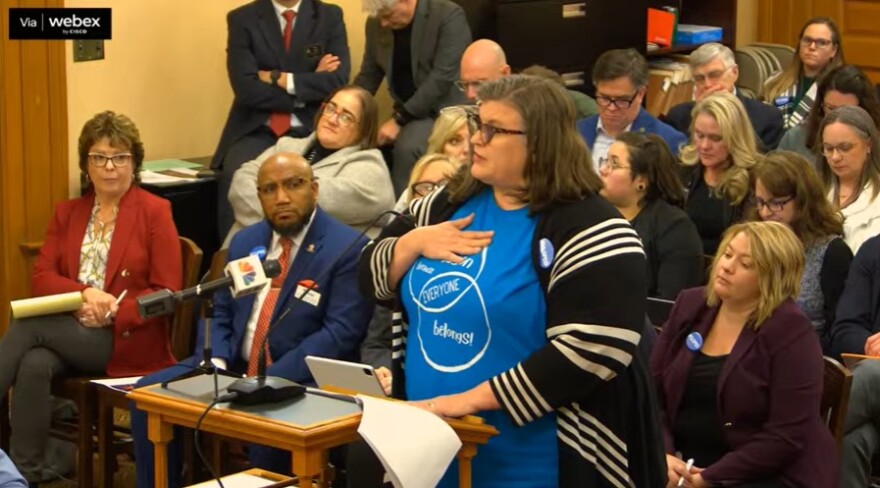WICHITA, Kansas — A group created by Kansas lawmakers to study special education has endorsed a plan to boost special ed funding by nearly $350 million over four years, a proposal supported by Democratic Gov. Laura Kelly.
The move would bring Kansas into compliance with state law, which requires the state to fund 92% of the extra costs of educating gifted children and those with special needs.
The group also recommended further study on how districts provide special education services, and it wants the state to reimburse schools for special ed costs more quickly.
“I think that this is the beginning of a conversation,” said Melanie Haas, chairwoman of the Kansas Board of Education, who was elected chair of the 10-member special ed task force. Lawmakers directed the group to present a report with recommendations to the Legislature this month.
“It’s not just that schools want more money,” Haas said. “There’s a lot of frustration on the different sides of this issue.
"Let’s talk about the alternatives: What are our other options? Where can we find common ground?”
Four Republican lawmakers on the task force opposed the recommendation for more funding, citing problems with the overall formula. They said public schools get more money for special education than their budgets reflect.
“We have a situation where there is money attributable to special education students, and we are not counting any of it,” said Republican Rep. Kristey Williams of Augusta. “Local option budget … at-risk, ELL (English language learners), transportation — all of those are negated out of the formula. But other things are strangely counted.”
The task force split 6-4 on the recommendation for increased funding. And that wasn’t the only point of conflict.
Republican Sen. Molly Baumgardner accused other members of the group of violating the Kansas Open Meetings Act. She alleged that some members held private conversations or sent emails to force Williams, the previous chairwoman, to schedule a meeting.
“If we are going to have a relationship as a task force of trust and working together, then I think we need to start by following the law,” Baumgardner said.
Haas rejected the allegations.
“This task force wasn’t called, and the reason for that was understood to be that Chair Williams wouldn’t have the votes and wouldn’t be chair,” Haas said. “I would like to rebut your suggestion that the Open Meetings Act was violated. It was not.”
The task force heard testimony from several school administrators, teachers and education advocates. Most of them urged the Legislature to boost funding for special ed.
Monica Brown, a special education teacher in the Gardner-Edgerton district in Johnson County, said schools make do with current funding but need more.
“We figure it out, but I need you to know: We cannot pour from an empty cup. You control the pitcher,” Brown said. “We’re doing our jobs for the kids. We expect you to do yours.”
Kellen Adams, superintendent of Leavenworth schools, said the current funding formula for special education is effective.
“I would urge you to first fully fund it before fully abandoning it for something else,” he said.
Adams said increased funding should be phased in while districts deal with severe teacher shortages. He said 40 of 70 teacher vacancies in the Leavenworth district are for special education positions.
“This is a heavily personnel-based part of the district, and it is often the most difficult part of the district to staff,” he said.
Dave Trabert, CEO of the Kansas Policy Institute, said the current funding formula “does not count all the money that’s attributed to special education.” He said some school districts receive more than 92% of their excess costs for special ed, and most districts carry over significant cash reserves.
“If it is all counted, then special education is overfunded,” he said. “We suggest that you fix the formula so that all of the money related to special education is counted.”
Suzanne Perez reports on education for KMUW in Wichita and the Kansas News Service. You can follow her on Twitter @SuzPerezICT.
The Kansas News Service is a collaboration of KMUW, KCUR, Kansas Public Radio and High Plains Public Radio focused on health, the social determinants of health and their connection to public policy.
Kansas News Service stories and photos may be republished by news media at no cost with proper attribution and a link to ksnewsservice.org.





